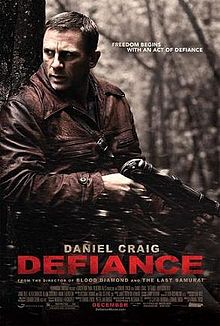
DEFIANCE
US, 2008, 137 Minutes, Colour.
Daniel Craig, Leiv Screiber, Jamie Bell, Alexa Davalos, Alan Corduner, Mark Feuerstein, Jodhi May, Iben Hjelje, George McKay?, Jacek Koman, Mia Wasikowska, Mark Margolis.
Directed by Edward Zwick.
This is a story of actual events and characters during the early years of World War II in Belarus. It is based on a history of the Bielski brothers and their efforts to save several hundred Jewish survivors hiding in the woods.
While the film begins with familiar footage of Hitler's speeches and the rounding up of Jews in the villages in the countryside and the massacre of those who resisted, the film then focuses on the initially ragtag group who begin to depend on the Bielskis, hungry, needing shelter, ill, subject to German raids or attacks from the local collaborating police but managing to eke out survival, shelter and food. When the freezing winter sets in, the times are desperately hard.
However, they are captured by a squad of Russian soldiers who are fighting partizan battles. They join with them at first but, later, they opt to try to live in peace in the woods, although one of the brothers, pugnacious by temperament, joins the Russians despite some of their blatant antisemitism. The group survive despite everything and even build up something of an alternate town as the war goes on.
The film is emphatically Jewish in its screenplay, not just the Nazi persecution and the local betrayals but in a religious sense. A teacher becomes the de facto rabbi for the group, the teacher of the religious traditions and an officator at weddings. References to the Jewish scriptures build to some allegorical parallels to the Hebrews' experience in Egypt, plagues and oppression and a direct comparison with the exodus and the crossing of the Red Sea – making us realise that, whatever happened in reality under Moses' leadership, the Book of Exodus is telling symbolic morale-boosting stories that God helps his people, especially if they help themselves.
Director Edward Zwick has shown interest in a variety of war experiences over the last twenty years: the African Americans and the Civil War in Glory, Desert Storm in Courage Under Fire, the opening up of Japan in The Last Samurai. His cast is unusual. Daniel Craig as the firm but peace-hoping brother has more opportunity for subtle and varied performance than as James Bond. Liev Schreiber is the gung-ho brother and Jamie Bell is the younger brother emerging into adulthood. Allan Corduner is impressive as the wise teacher.
The film is not easy to watch and Jewish audiences may hold their breath at some moments. There is little black and white – except that the Nazis and the collaborators are villains. The Russians are ambiguous in their attitudes. But the screenplay has some shocking eye for an eye moments as revenge is wrought, especially a Jewish mob in lynch revenge mood, bashing and kicking an ambushed German soldier.
An interesting postscript indicates that the two older brothers survived the war, migrated to America and worked together in a trucking business for thirty years – and never claimed any credit for the defiance and leadership they exercised in the war years.
1. The title? Expectations? World War II?
2. The locations, Lithuania for Belarus, the 1940s, life in the village, the Jews in the village, gatherings, worship, the Rabbi, teachers, intellectuals? The forest?
3. Dramatisation and war action, guerilla warfare, stunt work and action?
4. A true story, starting in August 1941, the Nazi occupation of the northern countries, the oppression of the Jews?
5. The Bielski brothers, therefore, the characters, relationships? Polish background? The death of their parents? Fleeing into the forest? A war of vengeance?
6. The number of refugees coming into the forest, the Jews, banding together, exercising raids, the local farms, getting food, supplies? The police and collaboration? The arrest? Tuvia killing the policeman? The attack on the Germans?
7. The brothers and their leadership, Tuvia as the oldest and the leader, the clash with Zus? The issue of the Jews, the increasing number, hiding, the dangers for all? The dispute, Zus leaving, his own group, collaborating with the Soviet partisans? The agreement, protection, supplies?
8. The depiction of the severe winter? The Germans preparing for attack? The Soviet partisans not helping?
9. Asei, the small group, slowing down the oncoming Germans, the number of deaths? His survival, with Sofiya?
10. The move towards the marsh, crossing the marsh, few casualties? The Panzer tanks confronting them? Seeming destruction? Zus, attacking from the back?
11. The final credits, hiding in the forest for two years, building hospital, building a school? The photos of the actual characters? Information about them? The brothers going to the United States, the truck-building business? This film as a tribute to them and their work, saving Jews?